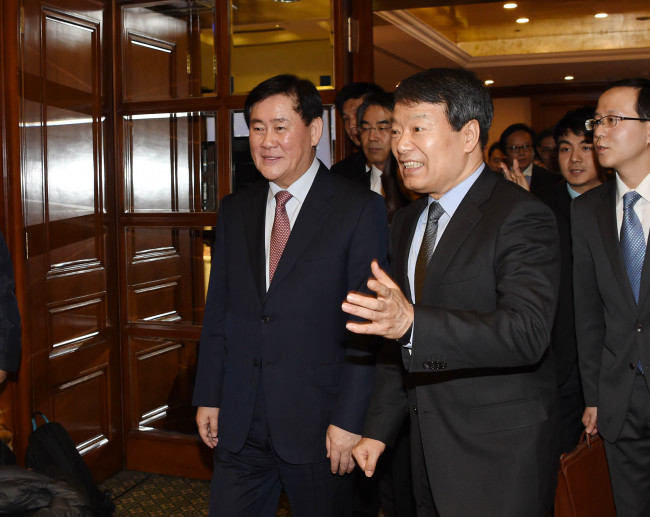South Korea and China agreed to strengthen economic ties through a free trade agreement, technology exchange, investment in venture start-ups, sharing urban policies and combating climate change, the country’s Finance Ministry said Thursday.
In a meeting between the economic chiefs of the two countries in Beijing, South Korea’s Deputy Prime Minister and Finance Minister Choi Kyung-hwan and China’s National Development and Reform Commission Xu Shaoshi also called for stronger partnership in dealing with external uncertainties stemming from volatile raw materials and oil prices.
 |
Korean Finance Minister Choi Kyung-hwan (left) is greeted by China’s National Development and Reform Commission Chairman Xu Shaoshi in Beijing on Thursday. (Yonhap) |
“It has become more important than ever that the two sides strengthen relations and build a stable foundation against global risks and uncertainties stemming from geopolitical conflicts, instable oil prices and financial markets,” Finance Minister Choi said in a meeting.
Choi noted that the International Monetary Fund recently revised down its global economic growth outlook from 3.8 percent to 3.5 percent, suggesting that the two sides should rapidly seal a free trade deal and boost won-yuan exchange to overcome economic difficulties.
He said the Korea-China FTA would be able to buffer the two trade partners against uncertainties by strengthening their domestic markets.
“The bilateral FTA will work like a breakwater and (protect) the two sides against global uncertainties,” Choi said.
“Also, stable trade and bilateral investment will further strengthen the two countries’ domestic markets.”
Korea and China also suggested a joint research project on developing Saemangeum, a reclaimed region on the west coast where the two sides agreed to establish a “China Valley” two years ago as part of efforts to boost bilateral investment.
Saemangeum connects the two cites of Gunsan and Gimje with Buan County, North Jeolla Province. Korea plans to develop the first phase of China Valley by 2020, and Korea and China will pursue their second development.
The two countries also agreed to conduct joint studies of the Eurasia Initiative, a vision proposed by President Park Geun-hye in 2013 to boost regional economic integration through infrastructure and trade.
By Park Hyong-ki (
hkp@heraldcorp.com)





![[Exclusive] Hyundai Mobis eyes closer ties with BYD](http://res.heraldm.com/phpwas/restmb_idxmake.php?idx=644&simg=/content/image/2024/11/25/20241125050044_0.jpg)
![[Herald Review] 'Gangnam B-Side' combines social realism with masterful suspense, performance](http://res.heraldm.com/phpwas/restmb_idxmake.php?idx=644&simg=/content/image/2024/11/25/20241125050072_0.jpg)

